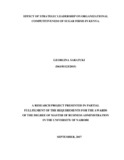| dc.description.abstract | Several researchers argue that the best methodology to attain organizational effectiveness is through the organizations being effective in strategy implementation processes. An effective strategic implementation provides an organization with a competitive edge and the implementation should be through the resolutions and actions of the firm‟ strategic leaders. This study sought to determine the effect of strategic leadership on organizational competitiveness of sugar firms in Kenya. The variables of the study leadership style, ethical issues, organizational culture and effective resource management. Three theories anchored this study; contingency theory, resource-based view (RBV) and upper echelons theory. The study adopted a descriptive research design and use questionnaires in conducting data collection. The research‟ target population comprised of all managers in the thirteen operational sugar firms in Kenya; 60 departmental managers from all the firms were selected using a convenient sampling method and used as respondents. Descriptive analysis was used to describe the effect of leadership style, ethical issues, organizational culture and effective management of organizational resources on organizational competitiveness in the Kenyan sugar firms. The nature and strength of association between the explanatory and dependent variables (organizational competitiveness) will be determnined by correlational and regression analyses methods. The research established that the assessed strategic leadership component; leadership style, ethical issues, organisational culture and effective organisational resource management, significantly impact the competitiveness hence the overall performance of organisations within the sugar sector in the country. Aligning an organization‟ leadership style to its transforming business environment enhances its effectiveness while improved organisational ethics enhance service delivery, employee efforts, reduced staff turnover, improved organizational commitment and social responsibility. Competiveness in the industry can also be attained through effective management of organisational human capital which is viewed as a key resource and by adopting a corporate culture that stress on all the key managerial constituencies within an organisation. | en_US |



